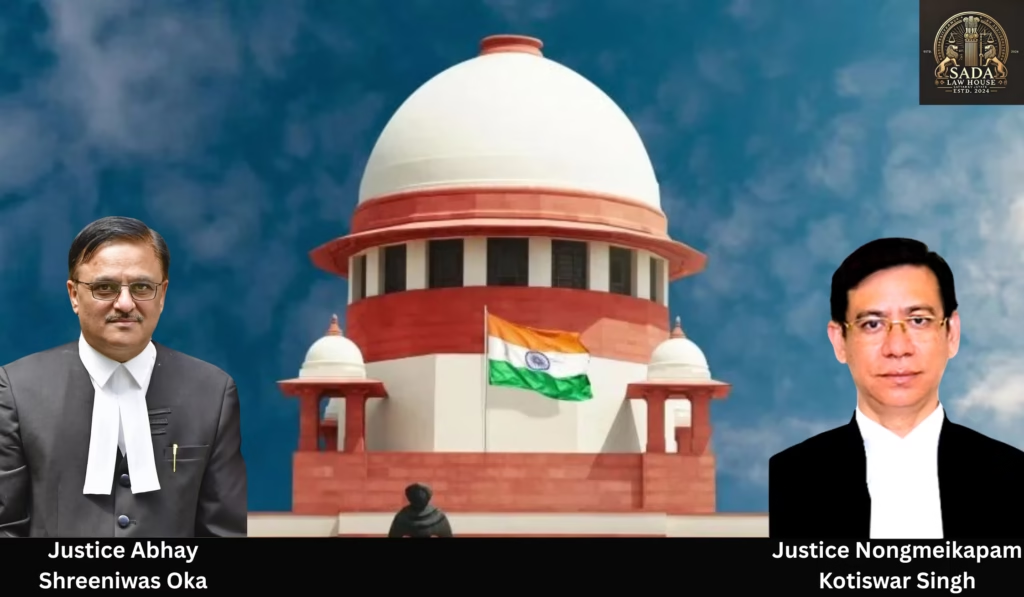Supreme Court on Unlawful Arrest: Vihaan Kumar Case and the Right to Be Informed of Grounds of Arrest
Trending Today Supreme Court on Unlawful Arrest: Vihaan Kumar Case and the Right to Be Informed of Grounds of Arrest Adultery and the Armed Forces: Applicability of the Joseph Shine Verdict Post-Decriminalization Steps to Protect the Great Indian Bustard: Insights from the Supreme Court’s Landmark Judgment Supreme Court’s Landmark Ruling on Nationality Under the Foreigners Act, 1946 – Md. Rahim Ali vs. State of Assam (2024) Supreme Court’s Landmark Judgment: States’ Power to Sub-Classify Scheduled Castes for Reservations Pakistan’s War Readiness in Crisis: Artillery Shortage Limits Combat Capability to Four Days Supreme Court’s Power to Grant Divorce Under Article 142: Shilpa Sailesh v. Varun Sreenivasan Judgment AIMPLB Challenges WAQF Amendment Act 2025: Supreme Court Affidavit Highlights Risks of De-registration Supreme Court: Bribery Conviction Under PC Act Requires Proof of Demand Beyond Recovery of Tainted Notes Supreme Court Clarifies Modification Powers Under Arbitration Act in Landmark Ruling Supreme Court on Unlawful Arrest: Vihaan Kumar Case and the Right to Be Informed of Grounds of Arrest NITU KUMARI 06 May 2025 Discover how the Supreme Court of India upheld constitutional rights in the 2025 Vihaan Kumar case, emphasizing the illegality of arrest without communicating grounds and the violation of human dignity through inhumane treatment. Overview In the landmark case of Vihaan Kumar vs State of Haryana, the Supreme Court of India reinforced the constitutional mandate under Article 22(1) of the Indian Constitution, ruling that failure to inform an arrested person of the grounds for arrest renders the arrest unlawful. Case Details Case Citation: 2025 INSC 162 Date of Judgment: February 7, 2025 Bench: Justice Abhay S. Oka, Justice Nongmeikapam Kotiswar Singh Criminal Appeal No.: 621 of 2025 Background of the Case On June 10, 2024, Vihaan Kumar was arrested in connection with FIR No. 121 of 2023 under Sections 409, 420, 467, 468, and 471 read with Section 120-B of the Indian Penal Code. He was taken from his office in Gurugram and presented before the magistrate only on June 11, exceeding the 24-hour limit set by Article 22(2) and Section 57 of the BNSS. During custody, Kumar was allegedly handcuffed and chained to a hospital bed at PGIMS Rohtak, violating his Article 21 right to dignity. Legal Issues Raised Key Constitutional Questions Was the arrest illegal due to non-communication of grounds under Article 22(1)? Did handcuffing and chaining violate the right to dignity under Article 21? Can subsequent legal proceedings validate an arrest tainted by constitutional violations? Supreme Court Judgment The Supreme Court ruled in favor of the appellant, declaring the arrest unlawful for violating Article 22(1). It ordered: Immediate release of the appellant. Nullification of remand orders. Issuance of guidelines against handcuffing accused individuals in hospitals. Violation of Article 22(1): Grounds Must Be Communicated The Court emphasized that arrested individuals must be clearly and effectively informed—preferably in writing—about the reasons for their arrest. Referring to cases like Pankaj Bansal v. Union of India and Prabir Purkayastha v. State (NCT of Delhi), the Court rejected vague oral notifications as insufficient. Violation of Article 21: Inhumane Treatment The act of handcuffing and chaining Kumar in a hospital bed was deemed a gross violation of his dignity. Photographic evidence led to disciplinary actions, including the suspension of involved police officers. Ineffectiveness of Subsequent Proceedings The Court ruled that legal procedures like remand or chargesheets cannot rectify constitutional violations at the time of arrest. Once an arrest is declared unconstitutional, all subsequent proceedings are invalid. Conclusion The judgment in Vihaan Kumar vs State of Haryana stands as a critical reaffirmation of constitutional rights and due process in Indian criminal law. It strengthens the legal framework protecting individuals against arbitrary arrest and emphasizes the role of the judiciary in upholding fundamental rights. This case sets a vital precedent for safeguarding civil liberties and ensuring accountability within law enforcement. Leave a Reply Cancel Reply Logged in as Sada Law. Edit your profile. Log out? Required fields are marked * Message* Case Laws Supreme Court on Unlawful Arrest: Vihaan Kumar Case and the Right to Be Informed of Grounds of Arrest Supreme Court on Unlawful Arrest: Vihaan Kumar Case and the Right to Be Informed of Grounds of Arrest Sada Law • May 6, 2025 • Case law • No Comments Adultery and the Armed Forces: Applicability of the Joseph Shine Verdict Post-Decriminalization Adultery and the Armed Forces: Applicability of the Joseph Shine Verdict Post-Decriminalization Sada Law • May 6, 2025 • Case law • No Comments Steps to Protect the Great Indian Bustard: Insights from the Supreme Court’s Landmark Judgment Steps to Protect the Great Indian Bustard: Insights from the Supreme Court’s Landmark Judgment Sada Law • May 6, 2025 • Case law • No Comments 1 2 3 … 5 Next »

